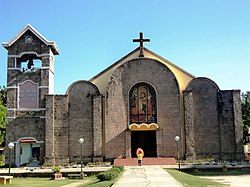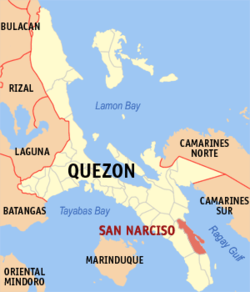San Narciso, officially the Municipality of San Narciso (Tagalog: Bayan ng San Narciso), is a 3rd class municipality in the province of Quezon, Philippines. According to the 2020 census, it has a population of 51,058 people.[3]
San Narciso | |
|---|---|
| Municipality of San Narciso | |
 San Narciso Church | |
 Map of Quezon with San Narciso highlighted | |
Location within the Philippines | |
| Coordinates: 13°34′04″N 122°34′00″E / 13.5677°N 122.5667°E | |
| Country | Philippines |
| Region | Calabarzon |
| Province | Quezon |
| District | 3rd district |
| Founded | February 2, 1846 |
| Named for | Narcissus of Jerusalem |
| Barangays | 24 (see Barangays) |
| Government | |
| • Type | Sangguniang Bayan |
| • Mayor | Florabelle U. Uy-Yap |
| • Vice Mayor | Elena R. Babao |
| • Representative | Reynante U. Arrogancia |
| • Municipal Council | Members |
| • Electorate | 31,708 voters (2022) |
| Area | |
• Total | 263.58 km2 (101.77 sq mi) |
| Elevation | 51 m (167 ft) |
| Highest elevation | 305 m (1,001 ft) |
| Lowest elevation | 0 m (0 ft) |
| Population (2020 census)[3] | |
• Total | 51,058 |
| • Density | 190/km2 (500/sq mi) |
| • Households | 12,199 |
| Demonym | San Narcisohin |
| Economy | |
| • Income class | 3rd municipal income class |
| • Poverty incidence | 19.81 |
| • Revenue | ₱ 183.5 million (2020) |
| • Assets | ₱ 657.4 million (2020) |
| • Expenditure | ₱ 145.1 million (2020) |
| • Liabilities | ₱ 215.7 million (2020) |
| Service provider | |
| • Electricity | Quezon 1 Electric Cooperative (QUEZELCO 1) |
| Time zone | UTC+8 (PST) |
| ZIP code | 4313 |
| PSGC | |
| IDD : area code | +63 (0)42 |
| Native languages | Tagalog |
| Website | www |
San Narciso is 178 kilometres (111 mi) from Lucena and 308 kilometres (191 mi) from Manila.
Churches and Geography
editChurches in San Narciso
San José Obrero Parish (est. 1846)
Nuestra Señora de la Paz y Buen Viaje Parish (est. 1994)
Geography
editSan Narciso has 24 barangays. Each barangay consists of puroks and some have sitios.
- Abuyon
- Andres Bonifacio
- Bani
- Binay
- Buenavista
- Busokbusokan
- Calwit
- Guinhalinan
- Lakdayan
- Maguiting
- Manlampong
- Pagkakaisa (Poblacion)
- Maligaya (Poblacion)
- Bayanihan (Poblacion)
- Pagdadamayan (Poblacion)
- Punta
- Rizal
- San Isidro
- San Juan
- San Vicente
- Vigo Central
- Villa Aurin (Pinagsama)
- Villa Reyes
- White Cliff
Climate
edit| Climate data for San Narciso, Quezon | |||||||||||||
|---|---|---|---|---|---|---|---|---|---|---|---|---|---|
| Month | Jan | Feb | Mar | Apr | May | Jun | Jul | Aug | Sep | Oct | Nov | Dec | Year |
| Mean daily maximum °C (°F) | 27 (81) |
28 (82) |
30 (86) |
31 (88) |
31 (88) |
30 (86) |
29 (84) |
29 (84) |
29 (84) |
29 (84) |
29 (84) |
28 (82) |
29 (84) |
| Mean daily minimum °C (°F) | 21 (70) |
21 (70) |
22 (72) |
23 (73) |
25 (77) |
25 (77) |
25 (77) |
25 (77) |
24 (75) |
24 (75) |
23 (73) |
22 (72) |
23 (74) |
| Average precipitation mm (inches) | 31 (1.2) |
23 (0.9) |
25 (1.0) |
30 (1.2) |
85 (3.3) |
145 (5.7) |
182 (7.2) |
153 (6.0) |
172 (6.8) |
150 (5.9) |
113 (4.4) |
68 (2.7) |
1,177 (46.3) |
| Average rainy days | 11.3 | 8.5 | 9.7 | 11.3 | 18.3 | 23.2 | 26.6 | 25.4 | 25.9 | 24.2 | 19.7 | 15.2 | 219.3 |
| Source: Meteoblue[5] | |||||||||||||
Demographics
edit| Year | Pop. | ±% p.a. |
|---|---|---|
| 1903 | 2,501 | — |
| 1918 | 2,752 | +0.64% |
| 1939 | 5,683 | +3.51% |
| 1948 | 7,006 | +2.35% |
| 1960 | 7,877 | +0.98% |
| 1970 | 17,876 | +8.53% |
| 1975 | 24,556 | +6.57% |
| 1980 | 28,958 | +3.35% |
| 1990 | 33,025 | +1.32% |
| 1995 | 36,535 | +1.91% |
| 2000 | 38,474 | +1.11% |
| 2007 | 39,828 | +0.48% |
| 2010 | 45,386 | +4.87% |
| 2015 | 48,461 | +1.26% |
| 2020 | 51,058 | +1.03% |
| Source: Philippine Statistics Authority[6][7][8][9] | ||
Economy
editPoverty incidence of San Narciso
10
20
30
40
50
60
70
2006
68.70 2009
41.13 2012
43.99 2015
35.25 2018
23.22 2021
19.81 Source: Philippine Statistics Authority[10][11][12][13][14][15][16][17] |
References
edit- ^ Municipality of San Narciso | (DILG)
- ^ "2015 Census of Population, Report No. 3 – Population, Land Area, and Population Density" (PDF). Philippine Statistics Authority. Quezon City, Philippines. August 2016. ISSN 0117-1453. Archived (PDF) from the original on May 25, 2021. Retrieved July 16, 2021.
- ^ a b Census of Population (2020). "Region IV-A (Calabarzon)". Total Population by Province, City, Municipality and Barangay. Philippine Statistics Authority. Retrieved 8 July 2021.
- ^ "PSA Releases the 2021 City and Municipal Level Poverty Estimates". Philippine Statistics Authority. 2 April 2024. Retrieved 28 April 2024.
- ^ "San Narciso: Average Temperatures and Rainfall". Meteoblue. Retrieved 27 January 2020.
- ^ Census of Population (2015). "Region IV-A (Calabarzon)". Total Population by Province, City, Municipality and Barangay. Philippine Statistics Authority. Retrieved 20 June 2016.
- ^ Census of Population and Housing (2010). "Region IV-A (Calabarzon)" (PDF). Total Population by Province, City, Municipality and Barangay. National Statistics Office. Retrieved 29 June 2016.
- ^ Censuses of Population (1903–2007). "Region IV-A (Calabarzon)". Table 1. Population Enumerated in Various Censuses by Province/Highly Urbanized City: 1903 to 2007. National Statistics Office.
- ^ "Province of Quezon". Municipality Population Data. Local Water Utilities Administration Research Division. Retrieved 17 December 2016.
- ^ "Poverty incidence (PI):". Philippine Statistics Authority. Retrieved December 28, 2020.
- ^ "Estimation of Local Poverty in the Philippines" (PDF). Philippine Statistics Authority. 29 November 2005.
- ^ "2003 City and Municipal Level Poverty Estimates" (PDF). Philippine Statistics Authority. 23 March 2009.
- ^ "City and Municipal Level Poverty Estimates; 2006 and 2009" (PDF). Philippine Statistics Authority. 3 August 2012.
- ^ "2012 Municipal and City Level Poverty Estimates" (PDF). Philippine Statistics Authority. 31 May 2016.
- ^ "Municipal and City Level Small Area Poverty Estimates; 2009, 2012 and 2015". Philippine Statistics Authority. 10 July 2019.
- ^ "PSA Releases the 2018 Municipal and City Level Poverty Estimates". Philippine Statistics Authority. 15 December 2021. Retrieved 22 January 2022.
- ^ "PSA Releases the 2021 City and Municipal Level Poverty Estimates". Philippine Statistics Authority. 2 April 2024. Retrieved 28 April 2024.
External links
edit- San Narciso Profile at PhilAtlas.com
- Philippine Standard Geographic Code
- Philippine Census Information
- Local Governance Performance Management System


